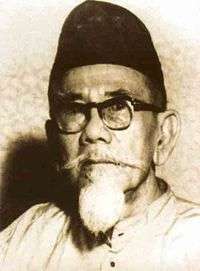Agus Salim
| Agus Salim | |
|---|---|
 | |
| 3rd Foreign Minister of Indonesia | |
|
In office July 3, 1947 – December 20, 1949 | |
| President | Sukarno |
| Preceded by | Sutan Syahrir |
| Succeeded by | Mohammad Roem |
| Personal details | |
| Born |
October 8, 1884 Kota Gadang, Agam, West Sumatra, Dutch East Indies |
| Died |
November 4, 1954 (aged 70) Jakarta, Indonesia |
| Nationality | Indonesia |
| Profession | Journalist, diplomat |
| Religion | Islam |
Haji Agus Salim ([ˈaɡʊs ˈsalɪm]; born Musyudul Haq;[1] 8 October 1884 – 4 November 1954) was one of Indonesia's founding fathers and prominent diplomats. He played a leading role in the creation of the Indonesian constitution in 1945 and served as Indonesia's Foreign Minister between 1947 and 1949.
Early life

Salim was born in Kota Gadang, Agam, West Sumatra to Sutan Muhammad Salim, a court official, and Siti Zaenab on 8 October 1884. His birth name was Musyudul Haq; Agus was his nickname.[1][2] His father was a prosecutor (called hoofd djaksa) in Riau High Court and once received the highest civilian medal from Queen Wilhelmina.[1][3]
In 1890, he began to study in Europeese Lagere School (generally only for Europeans) and graduated in 1897.[1] During that period, he also furthered his studies of Islam.[3] In 1897, he studied at Hogere Burger School and he earned the highest rank of HBS, when he was 19 years old.[1]
Salim was interested in studying medicine applied for a scholarship from the Dutch colonial government, but was refused.[1] In respect of his mother's last wish, at the age of 22 he took a job at the Dutch consulate in Jeddah, Saudi Arabia.[1][4] His family expected him to study religious science from his uncle, Syaikh Ahmad Khatib.[1] At the embassy, Salim translated and managed Indonesian's hajj pilgrimages.[4]
Career
In 1915, he joined Sarekat Islam under Tjokroaminoto's leadership and soon became second in command; Salim and Tjokorminoto became known as the dwi tunggal (English: the two who are one) due to their close cooperation.[2] Salim later replaced Tjokroaminoto after Tjokrominoto's death in 1934.[1]
In his hometown he opened a public school for native Indonesians, or Hollandsch Inlandsche School. Three years later, he worked as translator for the Landsdrukkerij in Batavia. In 1917 he also worked as Editor in Chief for the Neradja, and then as chief editor at Balai Pustaka. From 1917-1919, he became director of Bataviaasch Nieuwsblad, a Dutch-language newspaper.[1]
During the same period Salim wrote extensively on human rights and Indonesian independence. In "Progress as a Property Case", published on 11 October 1917, he argued that the Dutch reason for denying Indonesian independence, the lack of economic advancement, was ignorant of human history, citing slavery as an example. As long as Indonesians lacked political rights and independence, he argued, they would never gain economic advancement.[5]
Salim was a member of numerous committees for the preparation for Indonesian independence, including the Committee for Indonesian Independence Preparation, Committee of Nine, and the Formulator Committee; they wrote the preamble to Indonesia's constitution, including Pancasila.[6]
After the failure of the Linggadjati Agreement with the Dutch in March 1947, a delegation chaired by Salim went to numerous Arabic countries to seek de jure recognition of Indonesia's independence. Facilitate by Salim's command of Arabic, they succeeded; Egypt recognized Indonesia's independence on 10 June 1947, Iran in July 1947, and Lebanon and Saudi Arabia on 24 November 1947. Upon his return to Indonesia, Salim was hailed as an exemplary diplomat.[7]
Salim was also a member of the Indonesian delegation to the United Nations Security Council session at Lake Success, New York under Prime Minister Syahrir.[8]
During his political career, he served as foreign minister during Sjahrir II Cabinet, Sjahrir III Cabinet, Amir Sjarifuddin I Cabinet, Hatta I Cabinet, and Hatta II Cabinet.[1]
Salim died 27 days after his 70th birthday, on 4 November 1954.[1]
Legacy
Salim has been described as the "Grand Old Man of the Indonesian Independence movement and veteran leader of Indonesian Islam".[9] Sukarno described him as a "intellectual ulama" (Indonesian: ulama intelek), a leader combining Islamic science and Western teachings. Mohammad Hatta, called the Arabic de jure recognition of Indonesian independence Salim's greatest contribution to Indonesia.[10]
Salim was posthumously declared a National Hero of Indonesia in 1961. He also received the Satyalencana Peringatan Perjuangan Kemerdekaan on 20 May 1961 and the Bintang Mahaputera (level I) on 17 August 1960. One of the main roads in Jakarta is named after him.[1]
References
- 1 2 3 4 5 6 7 8 9 10 11 12 13 "Biography — Agus Salim". biographyinstitute.com. Retrieved June 10, 2011.
- 1 2 Kahfi 2000, p. 8
- 1 2 Kahfi 2000, p. 9
- 1 2 Kahfi 2000, p. 17
- ↑ Kahfi 2000, pp. 35–37
- ↑ Kahfi 2000, p. 76
- ↑ Kahfi 2000, pp. 2–3
- ↑ Kahfi 2000, p. 3
- ↑ Benda, Harry J. (1958). The Crescent and The Rising Sun. Indonesian Islam And The Japanese occupation 1942-1945. The Hague and Bandung: W. van Hoeve Ltd. p. ix. OCLC 22213896. in Kahfi 2000, p. 4
- ↑ Kahfi 2000, p. 4
Bibliography
| Wikimedia Commons has media related to Agus Salim. |
- Buku Peringatan, Panitia (1984). Seratus Tahun Haji Agus Salim. Jakarta: Penerbit Sinar Harapan.
- Kahfi, Erni Haryanti (2000). Haji Agus Salim : His Role in Nationalist Movements in Indonesia During the Early Twentieth Century (Master of Arts thesis). Canadian theses. Ottawa: National Library of Canada. ISBN 978-0-612-44090-6.
- Sularto, St. (2004). Haji Agus Salim (1884-1954): Tentang Perang, Jihad, dan Pluralisme. Jakarta: Gramedia Pustaka Utama. ISBN 979-22-1094-6.
| ||||||||
| ||||||
|
